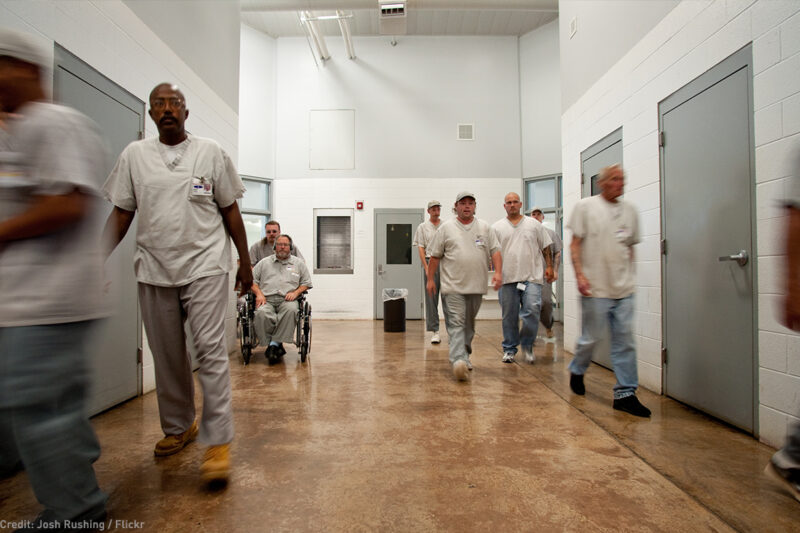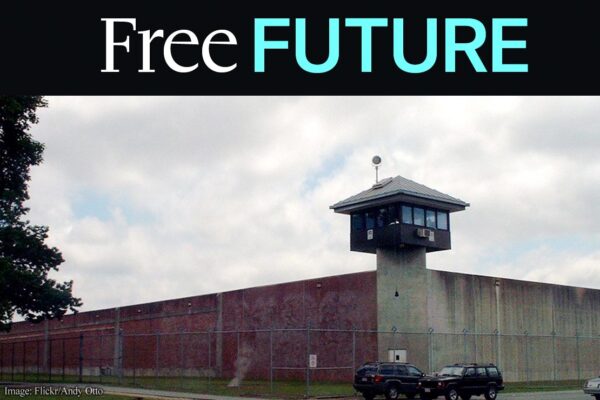Overcrowding in Nebraska’s Prisons Is Causing a Medical and Mental Health Care Crisis


Nebraska’s prison conditions are inhumane and unconstitutional, and ultimately, they hurt public safety. We can’t reduce recidivism rates among former prisoners if, instead of being given rehabilitation opportunities, they have been horribly traumatized during incarceration.
According to the U.S. Department of Justice, Nebraska’s prison system is one of the most crowded in the nation. All but one of our state prisons are over capacity — some are at 200 percent of capacity, and one is at more than 300 percent. The system is supposed to house approximately 3,275 people and is currently housing 5,228 people.
call for an end to dangerous conditions in Nebraska prisons
This means that people are sleeping in hallways and jammed into small cells designed for far fewer people. Even worse, there are critical shortages in medical and mental health staff, as well as a lack of frontline security officers.
In Nebraska’s prisons, you’ll find people who have waited months to be seen by a doctor for a broken bone, people who have not received medication for serious mental health conditions like schizophrenia or bipolar disorder, and people who are deaf or blind and have been given no accommodations for their disability. Besides that, there are hundreds of people who are being held for inappropriately long periods in solitary confinement. In fact, 13 percent of prisoners are isolated 23 hours a day, making Nebraska first or second in the nation for having the largest percentage of prisoners in solitary, according to a 2016 study by the Vera Institute of Justice. Many states only have 2 or 3 percent of their prison population in segregation.
These dire conditions have led to tragedy: riots, assaults on staff, and prisoners seriously beaten or killed. In the last two years, there have been multiple riots that left prison staff seriously injured and four prisoners dead. This must change, and we’re filing a class action lawsuit against the Nebraska Department of Correctional Services on behalf of all the men, women and youth behind bars to reform these conditions.
The stories from our clients who are currently incarcerated are horrifying.
We represent three prisoners who have spent months in 23-hour-a-day isolation as juveniles. We represent a deaf man who has had almost no opportunity to communicate with anyone who uses American Sign Language. Other clients are three prisoners who are blind and have been denied accommodation items provided by the state Commission for the Blind for free, like a talking clock. Some clients who use wheelchairs or walkers have only limited access to prison programs because not all parts of the prison are accessible.
Some of the abuses we’ve documented are inexplicable failures of the most basic medical care: a man with epilepsy who has landed in the hospital several times because he didn’t receive seizure medication. One woman who reported, upon entering prison, that she’d been raped six months earlier. She was given a routine physical exam, yet the staff somehow missed the fact she was pregnant until she unexpectedly went into labor.
These and other grave failures of medical care are connected to severe overcrowding. How did it come to this? Nebraska’s prison crisis is the result of decades of the failed “tough on crime” mindset and its attendant policies.
Nebraska lawmakers have repeatedly created new crimes and enhanced penalties while defunding mental health and substance abuse programs. This has given prosecutors more power to over-charge defendants. In fact, only New York and Washington D.C. have higher marijuana possession arrest rates than Nebraska. In a different era, a person caught with marijuana in Nebraska might have faced a single charge of drug possession. Now that person may face multiple felony charges: possession of the drugs, intent to distribute the drugs to others, failure to pay the drug tax stamp, and possession of cash related to the drugs.
This shift has helped to pack Nebraska’s prisons -- with 14 percent of prisoners serving time for drug related offenses. Another 16 percent are serving time for nonviolent property offenses such as theft, fraud, burglary, and shoplifting.
In other states, these people might receive intensive probation or early parole release. In Nebraska, 63 percent of prisoners are nonviolent offenders. These individuals could be back at home with their families, working and contributing to their communities, rather than being a burden on taxpayers in severely overcrowded prisons.
State lawmakers have approved some sentencing reforms that should curb growth in the prison population. But Nebraska is still sending too many nonviolent offenders and people with mental health and substance abuse issues to prison and there hasn’t been any improvement in the appalling living conditions for the thousands of Nebraskans already serving time.
We are better than this, as a state and as a nation. The Eighth Amendment to the U.S. Constitution requires humane treatment of prisoners. Until state leaders fix Nebraska’s prison system, we’ll be fighting for safe conditions in the courts and in the legislature.



